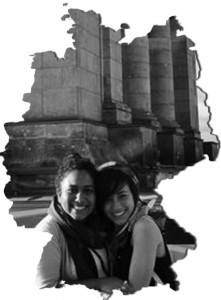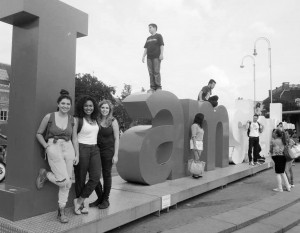 We planned to meet up at Minneapolis-St. Paul-International Airport to check-in together two hours before departing on our flight to Amsterdam. We were embarking together on a three month adventure on the Antioch Women and Gender Studies in Europe program. The program was set up so that we got a chance to live in the Netherlands, Germany, the Czech Republic, and Poland, including a break for independent travels. Despite the excitement of being with a fellow Gustie and the thrill of navigating the airport terminal, we both bid our goodbyes, not knowing what lay ahead.
We planned to meet up at Minneapolis-St. Paul-International Airport to check-in together two hours before departing on our flight to Amsterdam. We were embarking together on a three month adventure on the Antioch Women and Gender Studies in Europe program. The program was set up so that we got a chance to live in the Netherlands, Germany, the Czech Republic, and Poland, including a break for independent travels. Despite the excitement of being with a fellow Gustie and the thrill of navigating the airport terminal, we both bid our goodbyes, not knowing what lay ahead.
Upon arrival, it was clear that we were going to be keeping excellent company during our travels. Our 14 peers were intelligent, articulate, and passionate human beings. With such incredible individuals as travel buddies, our classroom environment was a space like none other. The workload is limited, however the depth of our readings, understandings, and discussions call for an academically challenging atmosphere we had not yet experienced. Imagine your 20-year-old classmate quoting Michel Foucault and Sigmund Freud effortlessly without a hiccup.
Studying abroad aims to disorient; it aims to challenge your theoretical perceptions of the world by introducing students to an incredible diversity of locations, societies, cultures, ideals, lifestyles, and approaches to activism. It is certainly overwhelming at times, but that is the process. We allowed ourselves to be overwhelmed by the politics of gender, race/ethnicity, homonationalism, immigration, prostitution, and sex work.In these emotions, we internally committed ourselves to being sources of information and knowledge, able to create dialogue and communicate for awareness, resistance, and social justice. Simultaneously, we’ve taken in what Europe has to offer culturally and historically, and it has so much to offer,as does Gustavus.
Gustavus has given us both the desire to question, discuss, and explore our curiosity. It’s the positive to having a liberal arts education.The interpersonal communicative skills we have both brought with us have enabled us to engage with locals effectively, partake in forward-moving conflict management, and simply being friendly.

More so we cultivated our mutual passion for social justice and humanitarian activism. We’ve realized that academics can be much more rigorous outside of that class with Richard Leitch or Jill Locke.There are so many ideas, terms, and words (who would’ve known?) to be learned and discussed. There are scholars we would have never been exposed to had it not been for this program alongside our brilliantly minded classmates. Beyond the classroom, whether we study abroad or not, our lives are enriched by our experiences and interactions. That Survey Monkey for the Religion Department, 5-minute FTS presentation, Building Bridges workshop, New York Times article for Philosophy, or a passing conversation in the Diversity Center are all experiences that shape and form our beings and beliefs. These orient us in the decisions and choices we make.
Disorientation is an aspect of our daily lives with varying scales of intensity. Gustavus has given us an eye for fighting against societal injustices and on-campus hate crimes, cultivating our devotion and passion for activism, and “changing the world.” It’s not cheesy at all! Building healthy and positively functioning environments and lifestyles is work for individuals and communities. It’s arduous, extreme, and takes consistency and tenacity. It requires us to understand that which is not ourselves (as in, losing some of ourselves) and to gain a better understanding of other parts of ourselves and the world. Basically, it’s a struggle. And studying abroad has deepened these feelings, just as being committed to humanity and healing its heartache is about being committed to the struggle forever.